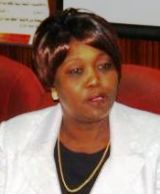Sudanese health minister’s advocacy of condoms sparks protest
By Peter Moszynski
June 27, 2006 (LONDON) — Sudan’s Federal health minister, Dr Tabitha Sokaya (SPLM), has provoked a political storm by publicly advocating condom use to stem the country’s HIV crisis.
 Although the extent of the HIV problem was largely unrecognised until monitoring began in southern Sudan last year, latest UNAIDS figures show that Sudan has the highest prevalence in North Africa and the Middle East, with 1.6% of adults and 3-8% of youth infected. An estimated 23 000 people have died of AIDS related illness.
Although the extent of the HIV problem was largely unrecognised until monitoring began in southern Sudan last year, latest UNAIDS figures show that Sudan has the highest prevalence in North Africa and the Middle East, with 1.6% of adults and 3-8% of youth infected. An estimated 23 000 people have died of AIDS related illness.
Dr Sokaya, who holds a PhD in nursing from Birmingham University, in the United Kingdom, returned to Sudan after last year’s comprehensive peace agreement, and was appointed minister of health in the national unity government established in September 2005.
She is the first woman to hold the post and the first Christian. Her job was one of four cabinet ministries awarded to the former rebel Sudan People’s Liberation Movement (SPLM) in the peace deal. Former colleagues explain that her position is somewhat constrained because northern Sudan is still governed by Islamic (sharia) law, and extramarital sex is, theoretically, a capital offence.
Her open speaking about AIDS and advocacy of condom use led to calls for her dismissal last week by MPs from the ruling National Congress party. Although few people take the threats seriously, they indicate the obstacles to effective implementation of Sudan’s national AIDS strategy.
A United Nations Population Fund spokesman, Abubakar Dungus, commented, “The male latex condom has proven to be the single most effective available technology to reduce the sexual transmission of HIV.”
Suleiman Mousa Rahhal, an opposition politician and UK trained virologist from the same Nuba Mountains district as Dr Sokaya, believes that AIDS has become such a problem because many Sudanese are “sexually hyperactive” but discussion of the subject is “culturally taboo” and condoms virtually unobtainable.
He alleges the previous government often covered up outbreaks of disease and says that the new administration must be more transparent: “Because the risk has never been properly explained in the media there is almost no public awareness of AIDS.”
He told the BMJ that HIV first became apparent 10 years ago. “Soldiers based near the Ugandan and Congolese borders were the first victims who carried the disease with them to neighbouring areas, which later spread centrifugally to other parts of Sudan.”
As thousands more soldiers and millions of displaced people return in the wake of peace, the risks of transmission are “dramatically increasing,” according to UNICEF, which estimates nearly 75% of Sudanese youth are sexually active but fewer than one in 10 knows how to use a condom.
UNICEF believes that 60 000 children have been orphaned by AIDS, and some 300 000 youths are infected and warns, “AIDS could undo all of the peace dividends if it’s not addressed now.”
(BJM/ST)
